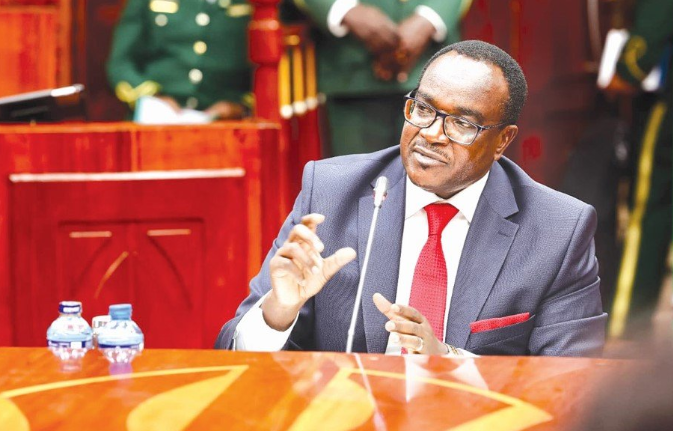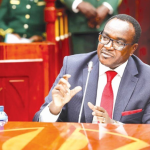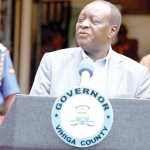About 51,628 students who reported to universities risk missing their examinations due to failure to clear fees linked to incorrect classifications in the new funding model, MPs learned yesterday. Documents presented to the MPs revealed that out of 124,364 students who reported to universities, only 75,000 paid their household contribution for admission, leaving 49,000 who have yet to pay and an additional 2,628 who did not apply for funding at the time of admission.
From a total of 138,535 students placed in universities, 124,364 reported to their respective institutions. The alarming revelations prompted MPs to call for a comprehensive overhaul of the funding model and directed Education Cabinet Secretary Julius Ogamba to issue a circular to universities, instructing them to allow the affected students to sit for exams, as many have been denied that opportunity.
Ogamba stated, “We have also instructed all public universities to admit placed students without requiring them to pay their household contributions. As of September 20, 2024, a total of 124,364 students out of the 138,535 placed had reported to their respective universities.
This means that 2,628 students had not applied for funding at the time of admission, and the number of students who have paid their household contribution (fees) stands at 75,000, or 60 percent.”
He added, “No student should be denied the chance to take exams because we are currently addressing this matter. As you have directed, we will issue that directive asking the universities to do just as we did with the admissions when we instructed them to allow all learners to be admitted.”
Regarding the complaints, Ogamba, who appeared before the education committee chaired by Tinderet MP Julius Melly, acknowledged the ministry’s concerns over the numerous issues raised regarding the Means Testing Instruments (MTI). He emphasized that they are working diligently to ensure the model meets the necessary scientific criteria for broad acceptance.
He revealed that in the 2024/25 cycle, they have received only 11,132 appeals, which they have yet to address, with the exercise set to conclude in December.
Ogamba explained that inaccuracies in the categorization of students into various bands stem from several challenges, including changes in internet access, varying levels of computer literacy, and a lack of knowledge about the application process. He noted that many applicants rely on cyber café attendants for assistance, which often results in inaccurate and generic information that does not accurately reflect the students’ needs.
Additionally, students sometimes provide false data out of fear of stigmatization or submit outdated information that does not represent their current economic situation, leading to misclassification in the funding bands.
During a recent session, Education Cabinet Secretary Julius Ogamba acknowledged that the current funding structure does not adequately reflect the diverse financial realities of Kenyan households, particularly those in the middle-income bracket. He assured parents with children transitioning to Grade Nine that the government aims to construct the 16,000 classrooms needed to accommodate these students by January next year.
Ogamba reported that the first phase of constructing 3,500 classrooms, costing Sh3.5 billion, is nearly 70 percent complete. He noted that the second phase, involving the construction of an additional 75,000 classrooms, will begin soon as the National Treasury has already released Sh4.3 billion for the project.
Additionally, he mentioned that the Kenya Institute of Curriculum Development has finalized the development of textbooks, which are set to be distributed later this month. Furthermore, the Teachers Service Commission (TSC) has trained 60,642 teachers and will conduct further training sessions in November and December.
However, MPs, led by Tinderet MP Julius Melly, expressed their frustration, stating that learners are suffering due to being denied the opportunity to sit for exams.
They raised concerns about parents struggling to pay fees as a result of incorrect classifications, which have placed them in the wrong funding bands. Melly emphasized the need for Ogamba to issue a directive allowing students to sit for exams while the issues surrounding the Means Testing Instruments (MTIs) are addressed.
Melly criticized the MTIs as being unreliable, stating, “These MTIs you are using are not giving us the right answers. We have had six meetings with the PS and those in this sector where they have taken us through the various variables and validators but we have not gotten any answers. What are you doing to ensure that you give us the right MTI that can provide accurate data?”
Additionally, Nyamira Woman Representative Jerusha Momanyi raised concerns from students who feel they are being forced to adopt a funding model that is not functioning effectively.
She said: “The concerns received from students is that you are not ready to deal with this model and are forcing the funding model down their throats. What are you doing as a ministry to correct this?”
Kibra MP Peter Orero asked the CS whether he is bold enough to admit that the MTI’s are not independent enough for them to place students in the right categorization.
He said: “Mr CS what are you doing to get us out of this problem.”
Marakwet East MP Timothy Toroitich proposed that the new funding model be suspended to allow parliament to scrutinize it because it is not working.



